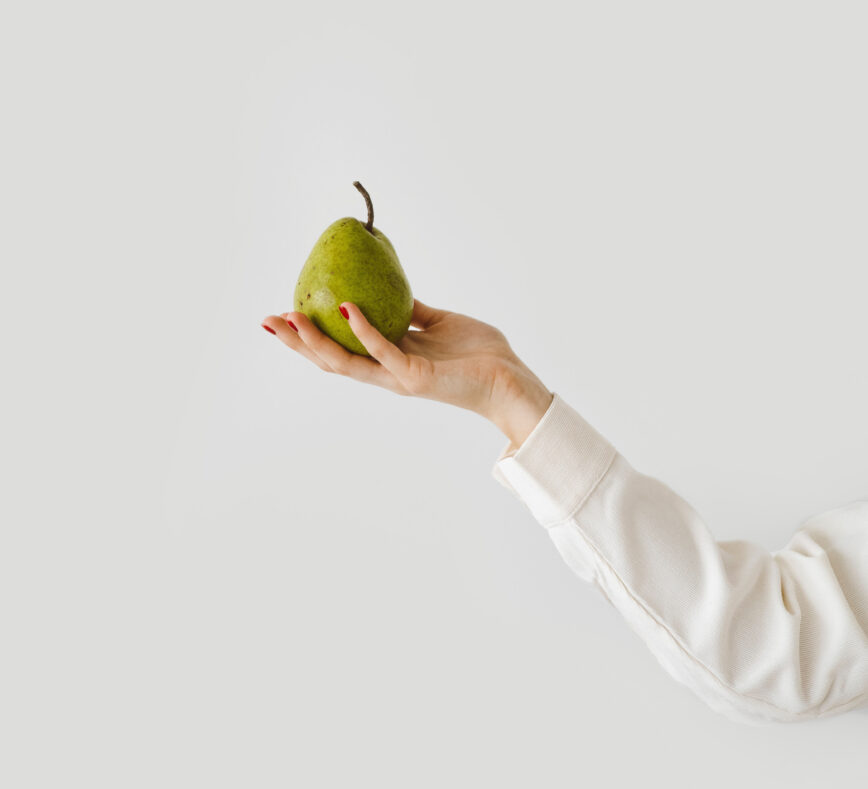
If you’re like us- you love leisurely walking the isles of your local Whole Foods or farmers markets. Scouting the newest and freshest foods is any foodie’s secret guilty mundane pleasure. However, as you’re deciding between the normal lemonade or the “USDA Organic” one, do you ever ask yourself these honest and brutal questions. “What does Certified USDA Organic actually mean? Can I trust the organic food label, and should I seriously be spending the extra $2-4 on this?”
In a world full of options and decisions- shopping at the grocery store is no exception. So, we are here to talk you through what the organic food label actually means. At the end of the day, we want to understand if the organic food labels can be trusted.
In this blog:
- What does it mean when a food is labeled organic
- What do these labels look like on your food
- Organizations behind these labels
- Can we trust that our foods are actually organic?
- 11 Purchasing Principles
What exactly does it mean when a food is labeled as ‘Organic’?
Before we dive it, it is first important to understand what ‘organic’ food means.
You may have noticed foods with little, tiny stickers- or labels that read- “USDA Organic”, “CCOF Organic,” or “Certified Organic.” Although the certifier—whether an agency or organization—that certifies a product as organic may vary the meaning and standards remain the same.
Food that is labeled as such, signify that the foods are produced in a way that meet the standards. These standards are regulated by the national organic program.
These standards are specific farming methods that consider biological, cultural, and mechanical practices that promote ecological balance, biodiversity, and animal welfare cycling resources. Organic food can also be defined by the products and processes that are prohibited which include, synthetic fertilizers, sewage sludge, irradiation, and genetic engineering.
In simple terms, organic foods will tend to have less ingredients lists. Overall this is true because there is less processing involved.
Organic Farming & Food Means, No Short Cuts
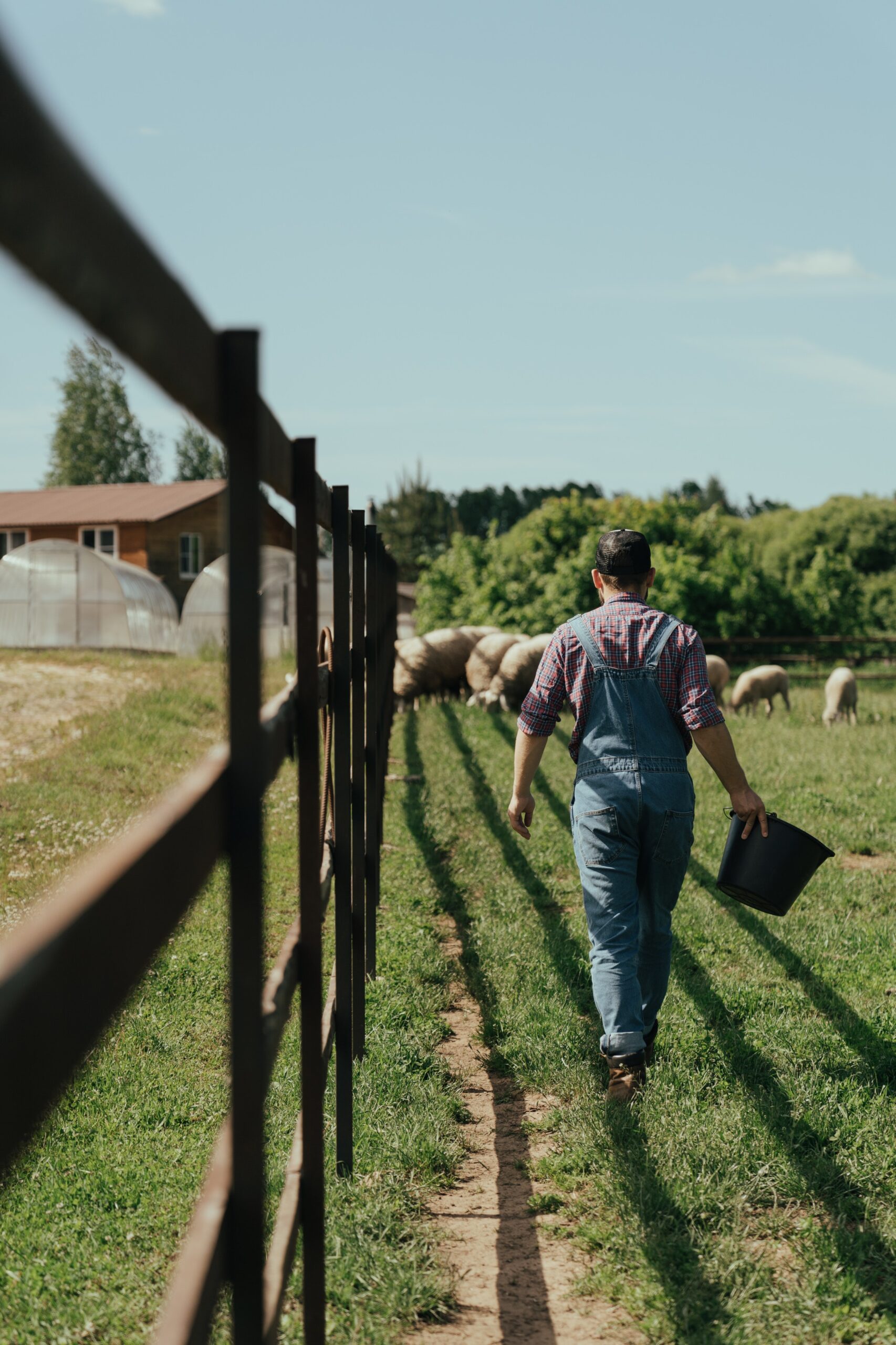
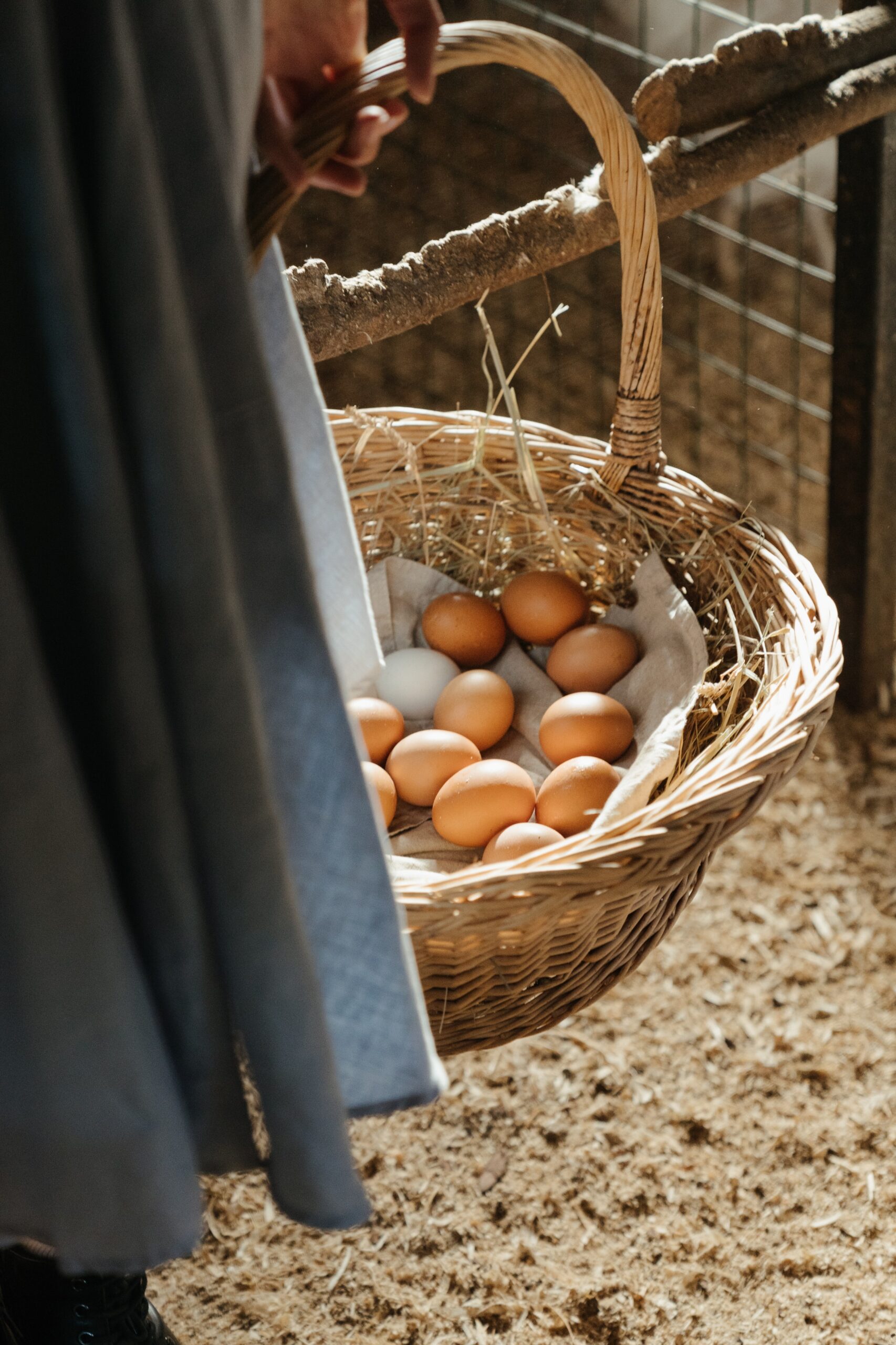
Organically produced foods do not take the short cut. When you compare organically grown foods to those produced ‘conventionally’—using synthetic fertilizers or irradiation—you will quickly see that organic farming is hard work. Organic farming requires a deep connection with the land. This requires skills to understand the best wy to grow crops or produce foods.
For example, instead of spraying the crop to fight off pest or diseases, in organic farming, farmers learn how to use technics like cover cropping to better maintain the soil. When the soil is healthy in organic farming practices, it is easier to fight off diseases and pests that can damage the crop. Cover Crops, help with a number of different concerns on the field (like erosion) but it takes great knowledge to learn what type of cover crop to plant and when to rotate.
Organic farming takes time and a lot more labor compared to conventional farming.
In some circles, organic farming is even described as “real farming.” This takes a tough jab at conventional farming.
What do these organic food labels look like on your food
Organic labels on food can come in all kinds of shapes and sizes. Although they all look similar some mean the same thing and others don’t. Here are all the labels that you may find at the grocery store that are certified organic products.
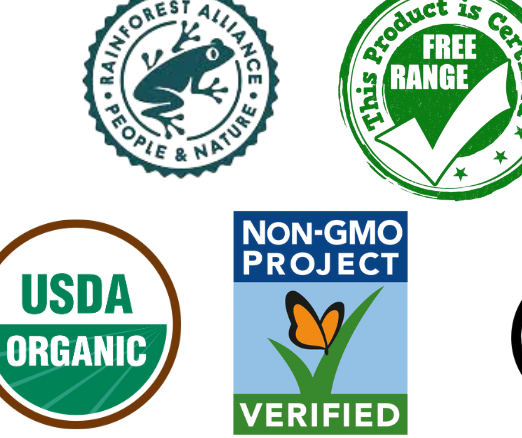
It’s important to note that some labels may sound similar to “organic” but don’t actually mean the same thing.
For example, the “non-GMO Project” label does not equal organic. This label simply means no GMOs were used in the making of the product, but it doesn’t guarantee that synthetic ingredients or pesticides weren’t used. In contrast, the certified organic label means that no GMOs were used, and that the product meets all the strict standards set by the USDA’s federally managed program, which bans a range of synthetic chemicals and practices.
Here’s a simple formula:
- Non-GMO ≠ Organic
- Organic = Non-GMO and More
In other words- it’s like saying: Every apple is a fruit, but not every fruit is an apple. Similarly, all organic products are non-GMO, but not all non-GMO products are organic.
Who are the organizations behind organic foods labels
Before a business can label their food with one of these “certified organic” labels, first they have to work directly with a certifier. The certifier confirms their business follows the standards set by the NOP. Their organizations can be non-profits, private business, federal or state agencies. They are the people behind the organic food labels.
A food product cannot simply place the seal on their food without first going through the food auditing systems. These systems are what truly prove that a business is following the standards correctly. These organic certifiers have an in-depth process and systems of auditing an organic food business. This includes submitting an Organic System Plan (which is the equivalent to a business plan). Then an inspector inspects their farm/business. Finally, they must continue to comply with all the regulations.
When they are able to match and pass, the business is then awarded with their organic certification. For many farmers or food producers obtaining an organic food certification can be a long and complicated process. Especially for farmers that have previously used their lands to farm “conventionally.” For those transitioning, there is a standard amount of time they have to prove they stopped using forbidden products on their land in order to even qualify.
Here is a list of some prominent organic food certifiers in the USA:
- USDA Organic Certification: The United States Department of Agriculture (USDA) oversees the National Organic Program (NOP), which accredits third-party organizations to certify that farms and businesses meet organic standards.
- Oregon Tilth Certified Organic (OTCO): One of the leading certifiers in organic agriculture and products.
- California Certified Organic Farmers (CCOF): Offers organic certification services primarily in California, but also internationally.
- Quality Assurance International (QAI): Provides organic certification and other food safety certifications.
- Pennsylvania Certified Organic (PCO): Certifies organic operations in Pennsylvania and other states.
- Organic Crop Improvement Association (OCIA) International: Offers organic certification services globally.
- Washington State Department of Agriculture (WSDA) Organic Program: Certifies organic operations in Washington state.
These organizations are accredited by the USDA NOP to ensure that organic products meet the standards set forth in the Organic Foods Production Act (OFPA). Each certifier may have specific areas of expertise or regions they primarily serve, so it’s essential to check with them directly for details.
Can We Trust That What We Are Buying is Actually Organic Food?
Although there are numerous farmers, inspectors, regulations, and enforcers behind the organic label, this hasn’t stopped the bad guys from taking advantage of a consumer-driven, farmer lead, industry. Fraud, misleading labeling, and greed have all taken away from the ideals and values of selling and purchasing organic. At the end of the day this has caused mistrust in the USDA regulated label.
In any-case, what may have started as a trend or value system in the United States, is expanding worldwide. This hype and clear consumer demand has even enticed several of the OG brands to take a step into producing and start selling organic products. Heineken is a clear example:
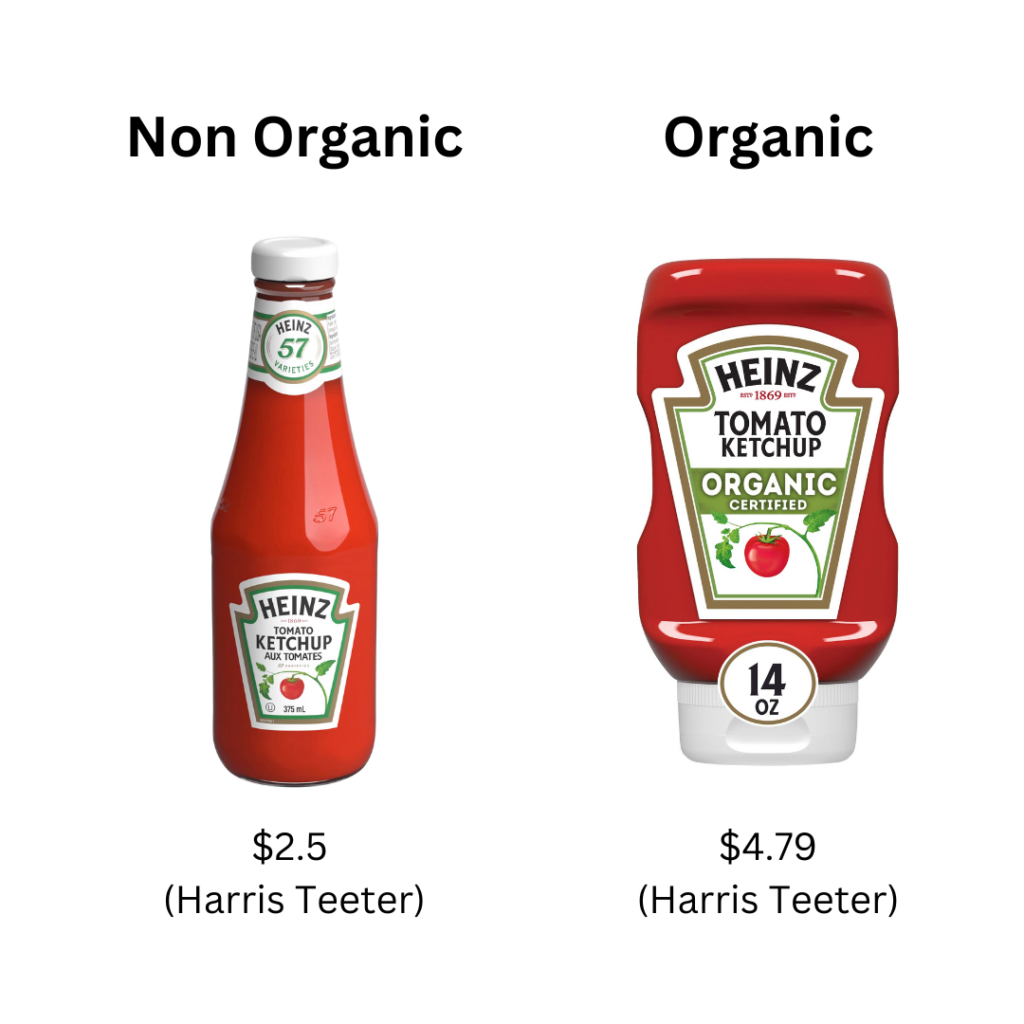
The idea of organic food with no GMOs and produced in a way that eliminates a lot of harsh products, is a new ideal. As we outlined in our previous post, organic foods also hold many benefits to you and the planet. Stephanie Brown, a nutrition writer- outlined how many have even decided to go organic for the sheer fact that it is healthier for the farmers themselves.
She quoted, “We have something like 10,000 agricultural workers that are acutely poisoned by pesticides in the U.S. each year, and that’s not happening when we’re not using synthetic pesticides.”
The Rise of Sustainability

With the growing awareness of issues like climate change, self-care, and regenerative practices, more and more consumers are demanding products from mission-driven businesses. As a result, companies are investing in marketing strategies that align with these values. Consumers are increasingly making purchasing decisions based on the ideals and values they want to support. Business have assigned value to focusing on addressing these pressing global challenges.
Many have even seen the pay off in big ways monetary
Although a product may scream “natural and good for the planet,” this might not always be the case.
Navigating the Organic Food Fraud Cases
In most recent years- many food grocers and even farmers- have wanted to get their piggy banks fed by the premium prices of organic food prices without actually being organic. This is where we get into the contrives.
Organic Fraud.
In an article published by Modern Farmer titled, “Can you trust the Organic Food Label,” they confront the fraud full force- detailing how big companies are able to falsify making millions of millions of dollars from it.
Then there are the smaller farms, who may not even know they are engaging in fradulent activity. They may be selling their products at the local farmers market, calling it ‘organic food’ to their customers even though it is technically not.
However, for many smaller farmers that have built a relationship with their customers- labeling their food organic actually does not benefit them anymore. Before when the label truly meant something to them, there was a return on investment- but now- not so much. Their community trust is enough to keep their sales right about the same even without the label.
Strengthening Organic Enforcement (SOE)
In March of 2024, SOE was the big talk through the organic food industry. This regulation was the beacon of hope for many that want to keep banking on organic food, labels, and consumer integrity. After all, as food shoppers- especially those in big cities, we don’t have the time to go around scouting out farmers or markets for high-quality produce.
With these new regulations- many of the supply chain that was not required to obtain a certification in the past- are now obligated to comply. This was the biggest update to the NOP since its birth, and serving as a way to close the loopholes that created opportunities for fraud in the past.
Grocery Store Landscape Today
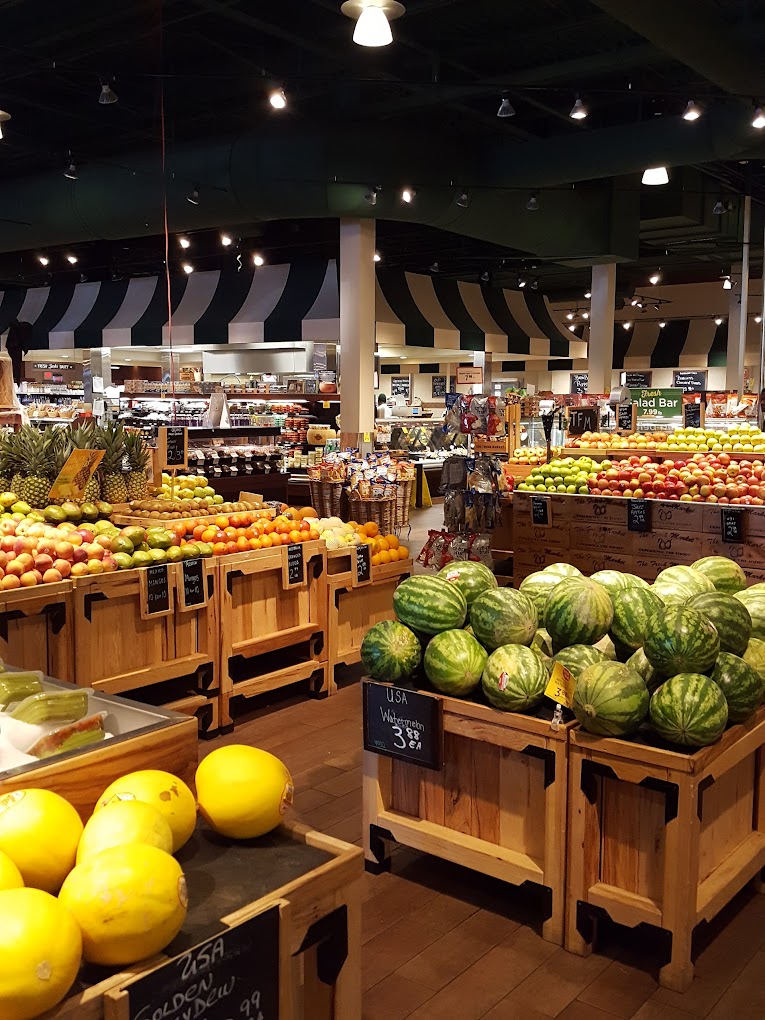
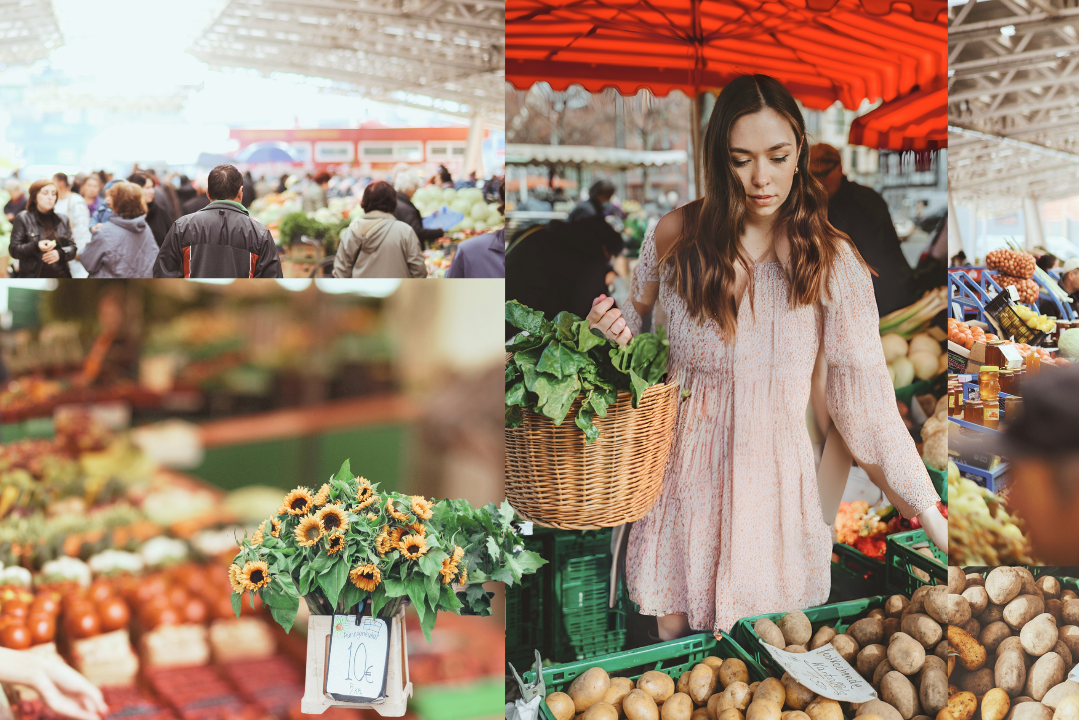
If you’re a nutrition nerd, overall foodie, or just a general environmental book worm, you may have leaned into the hype of Michael Pollans famous book, The Omnivores Dilemma. For those that have no idea what we’re talking about, Pollans book takes readers into a journalistic narrative, that explores and ventures into the American Diet. The Four pillars that Pollan explores is based on the reality that Americans are overloaded and confused as they make their way into a grocery store.
So now- you’re right where we started at the beginning trying to tackle your dilemma of what ketchup bottle you’re going to buy- the organic one of the non-organic one.
Even with the SOE updates put in place last year- there are still opportunities of doubt, however, there organic foods still make a strong case for.
Our 11 purchasing principles when buying groceries:
1. Support Local Farmers
When you have the opportunity to buy directly from a farmer- do it. This can generate an increase in regional economies and it reduces environmental impact from things like transportation. Don’t be afraid to get to know your farmer markets vendors and ask questions.
2.Prioritize Sustainability:
Look for products that are packaged in eco-friendly packaging like cardboard, paper, and biodegradable packaging. This speaks volumes for how a food business prioritizes sustainability- even if it costs them more.
3.Buy Organic When Possible
If it fits into your budget, and if the product is worth it- Opt for organic products. Voting with your dollars is a way to make a small difference to reduce exposure to harmful pesticides. This also supports organic farming practices that are gentler on the environment and on animals.
4.Seasonality Matters
Purchase fruits and vegetables when they are in season. This will secure that your foods and vegetables are most likely coming from local farms, rather than being shipped in from other countries. A a bonus of buying seasonally- is that they also hold a lot more flavor 😉
5. Check for Fair Trade or ROC Certification
Support products that ensure fair wages and ethical working conditions for farmers and workers in developing countries.
6. Focus on Whole Foods
Even though Organic food labels are the gem among all the certification food labels out there- they do not necessarily hold much nutritional weight. When you’re able to minimize processed or heavily packaged items. Instead, focus on products that are whole foods even if you have the make the decision of purchasing them non organically.
7. Avoid Excessive Food Waste
As you’re meal prepping or the week- make a clear list of all the food ingredients you need to make those meals. This will help you stick to what you need and purchase more organic food- especially if you’re on a budget.
8. Look for Certifications
As you’re at the grocery store, take your time to read and lookout for organic food labels. Compare them to other food labels out there like “non gmo”, etc.
9.Invest in Long-Term Health
Choose nutrient-dense, minimally processed options that contribute to your well-being over time.
10.Align with Your Values
Support companies whose missions reflect your personal values, whether it’s environmental responsibility, animal welfare, or social justice.
11.Shop Guilt Free
Last but certainly not least, don’t hold on to shame or guilt surrounding your purchasing choices. Although we want to do the best we can to feed ourselves, contribute to a mission, and stay on budget- the three are not always possible. So, instead, be okay with what you’re able to purchase when you’re able to purchase it. If you value Organic food and they overall value/mission consider how you can buy more of it in the future without regretting where you’re at now.
Will you Buy Organic Food?
We want to hear from you! Let us know what your experience has been purchasing organic food and what side of the fence you stand on.
.



[…] Organic Food: A Complete Guide to Understanding the Basics […]